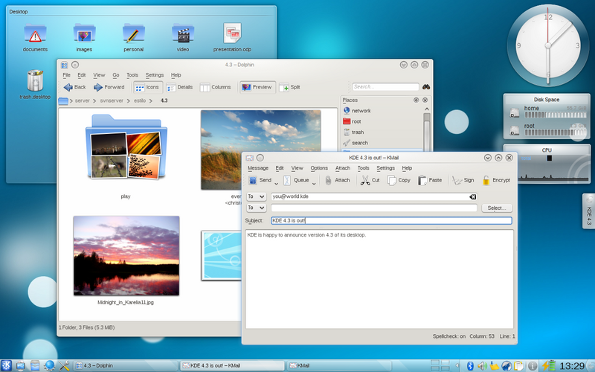Most UNIX systems are commercial in nature.
Linux is a UNIX Clone
But if you consider Portable Operating System Interface (POSIX) standards then Linux can be considered as UNIX. To quote from Official Linux kernel README file:
Linux is a Unix clone written from scratch by Linus Torvalds with assistance from a loosely-knit team of hackers across the Net. It aims towards POSIX compliance.
However, “Open Group” do not approve of the construction “Unix-like”, and consider it misuse of their UNIX trademark.
Linux Is Just a Kernel
Linux is just a kernel. All Linux distributions includes GUI system + GNU utilities (such as cp, mv, ls,date, bash etc) + installation & management tools + GNU c/c++ Compilers + Editors (vi) + and various applications (such as OpenOffice, Firefox). However, most UNIX operating systems are considered as a complete operating system as everything come from a single source or vendor.
As I said earlier Linux is just a kernel and Linux distribution makes it complete usable operating systems by adding various applications. Most UNIX operating systems comes with A-Z programs such as editor, compilers etc. For example HP-UX or Solaris comes with A-Z programs.
License and cost
Linux is Free (as in beer [freedom]). You can download it from the Internet or redistribute it under GNU licenses. You will see the best community support for Linux. Most UNIX like operating systems are not free (but this is changing fast, for example OpenSolaris UNIX). However, some Linux distributions such as Redhat / Novell provides additional Linux support, consultancy, bug fixing, and training for additional fees.
User-Friendly
Linux is considered as most user friendly UNIX like operating systems. It makes it easy to install sound card, flash players, and other desktop goodies. However, Apple OS X is most popular UNIX operating system for desktop usage.
Security Firewall Software
Linux comes with open source netfilter/iptables based firewall tool to protect your server and desktop from the crackers and hackers. UNIX operating systems comes with its own firewall product (for example Solaris UNIX comes with ipfilter based firewall) or you need to purchase a 3rd party software such as Checkpoint UNIX firewall.
Backup and Recovery Software
UNIX and Linux comes with different set of tools for backing up data to tape and other backup media. However, both of them share some common tools such as tar, dump/restore, and cpio etc.
File Systems
- Linux by default supports and use ext3 or ext4 file systems.
- UNIX comes with various file systems such as jfs, gpfs (AIX), jfs, gpfs (HP-UX), jfs, gpfs (Solaris).
System Administration Tools
- UNIX comes with its own tools such as SAM on HP-UX.
- Suse Linux comes with Yast
- Redhat Linux comes with its own gui tools called redhat-config-*.
However, editing text config file and typing commands are most popular options for sys admin work under UNIX and Linux.
System Startup Scripts
Almost every version of UNIX and Linux comes with system initialization script but they are located in different directories:
- HP-UX – /sbin/init.d
- AIX – /etc/rc.d/init.d
- Linux – /etc/init.d
End User Perspective
The differences are not that big for the average end user. They will use the same shell (e.g. bash or ksh) and other development tools such as Perl or Eclipse development tool.
System Administrator Perspective
Again, the differences are not that big for the system administrator. However, you may notice various differences while performing the following operations:
- Software installation procedure
- Hardware device names
- Various admin commands or utilities
- Software RAID devices and mirroring
- Logical volume management
- Package management
- Patch management
UNIX Operating System Names
A few popular names:
- HP-UX
- IBM AIX
- Sun Solairs
- Mac OS X
- IRIX
Linux Distribution (Operating System) Names
A few popular names:
- Redhat Enterprise Linux
- Fedora Linux
- Debian Linux
- Suse Enterprise Linux
- Ubuntu Linux
Common Things Between Linux & UNIX
Both share many common applications such as:
- GUI, file, and windows managers (KDE, Gnome)
- Shells (ksh, csh, bash)
- Various office applications such as OpenOffice.org
- Development tools (perl, php, python, GNU c/c++ compilers)
- Posix interface
A Sample UNIX Desktop Screenshot
A Sample Linux Desktop Screenshot
UNIX and Linux Hardware
Commercial UNIX hardware has more advanced initial boot options such as:
- Decide how to boot
- Check system health
- Set hardware parameters etc
The BIOS that is standard in PCs which is used by Linux has few, of these features. UNIX hardware or servers are pretty expensive as compare to Linux server systems.


Comments